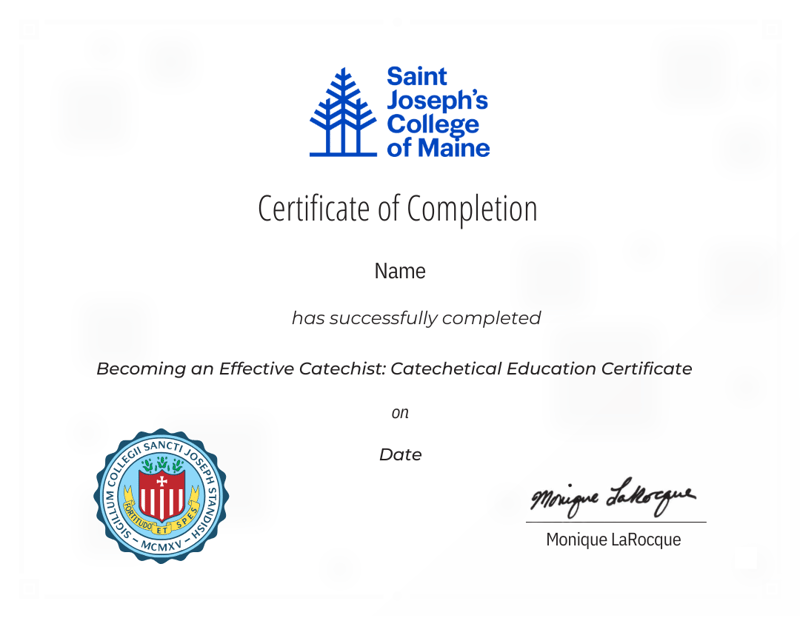Who is this Program for?
-
This credential is for all leaders in the mission of faith formation. This includes Catholic school administrators, department chairs, DREs (Directors of Religious Education), and Directors for Diocesan and Parish Ministries.
-
All who teach in parishes are encouraged to become certified in the foundations of the Catholic faith. This includes volunteers and staff providing sacramental preparation, religious education, youth ministry, Rite of Christian Initiation of Adult and Children coordinators, leaders of Bible studies, and any other program of faith formation.
-
Religion teachers in Catholic schools.
-
All who are interested in deepening one’s faith and participating in the Catechetical mission of the Church. This can include Catholic communications and media development, homeschooling, and interest group leadership.

Why Seek a Catechetical Certification?
The Importance of Catechetical Teaching
Course Overview
This credential presents the foundations of Catholic theology and educational pedagogy to facilitate catechesis at all levels. Unique to this program is that the modules present a Catholic worldview by using Catholic Social Teaching as the springboard for explanation/application of pedagogical practices from planning, and classroom management to common 'teacher hacks'. The 2020 Directory for Catechesis, Catechism of the Catholic Church, and the Acts of the Apostles are the main references during the credential.
Not all Catechists have been trained in Theology or pedagogical best practice. Knowing and teaching are two different things. This micro-credential will outline evidence-based best practices in education and give an overview of Theological topics, giving students the tools and critical resources needed to improve their practice as a Catechists, engaging others in the learning of the faith.
Module 1: Catechesis and the Catechist. This module reviews the role of Catechesis and the vocation of the Catechist through the considerations provided in Church documents, particularly the 2020 Directory for Catechesis. Reflecting on the Divine pedagogy in salvation history and especially in Jesus, the importance of process, storytelling, and questioning will be recommended as teaching techniques. The importance of Kerygma and the Holy Spirit are to be understood as essentials for all information.
Module 2: Catechetical Tools. In this module, students will learn what the Catholic Primary Resources are, how to find them, and how to use them in all aspects of catechesis including lesson development, environment, and communications with stakeholders. Students will be able to model the use of Catholic sources, so all will learn what the sources offer in content and where to search with their questions. Resources available for deeper study into Catholic Social Teaching will be introduced.
Module 3: Lesson Structuring. This module will introduce the suggested structure that most catechetical lessons can easily follow. A general history, purpose, and use of Catholic Social Teaching will be introduced, as the principles in Catholic Social Teaching (the Gospel in action) will be used as a basepoint in subsequent learning.
Module 4: Applying Catholic Social Teaching in Catechesis – Being Made in God’s Image. Students will reflect on what it means to be made in God’s image and important distinctions in the human person. This view of the human person will affect the approach to individual students, conflict resolution, and classroom management. An overview of the Theology of the Body and some bioethical issues will be presented.
Module 5: Applying Catholic Social Teaching to Catechesis: Call to family, community, participation and Solidarity. Recognizing that the Trinity is a relationship of love and has created us as social beings to lead us to participate in God’s love, students will evaluate how to encourage their students’ personal responsibility in fostering positive relationships with other students, family members, and local and global communities. Attendees will also reflect on his/her role in relationship to others and what is not within the scope of the catechist’s role according to the principle of subsidiarity, learn strategies for developing group work with students, appreciate the incorporation of culture, discover the opportunities of using the saints as examples and intercessors, and learn where to find principles and answers to questions on morality in the Catechism of the Catholic Church.
Module 6: Applying Catholic Social Teaching to Catechesis: Rights, responsibilities, and the dignity of work and workers. Students will be reminded of the principles of being endowed with inalienable rights, the responsibility of each person to use these rights and respect them in each person, the common good, the dignity of work and the need to protect the others’ rights. As the work of God is continued in the Sacraments, an overview of Section II of the Catechism of the Catholic Church will be presented. Pedagogical topics will introduce educational movements such as the growth mindset vocabulary within God’s Grace. The importance of established and practiced class and personal procedures will be emphasized.
Module 7: Option for the Poor and the Vulnerable. Students will be given an overview of the CST principle of the preferential option of the Poor. The Church’s view of Faith and reason and the Catholic worldview in all academic subjects will be presented. Pedagogically, students will learn the importance of setting good climate and a physical and emotional environment conducive to catechesis.
Module 8: Care for God’s Creation. Students will apply the knowledge that grace builds on nature and that the Sacramental worldview values the created world as a God-given gift which means to grow in God’s love. Students will learn the most accepted stages of development in the human person so as to better understand self as well as the students. Attendees will also learn the importance of creating a classroom environment, both physically and emotionally, that supports students learning. Attention will also be given to recent Church documents on the importance of creation.
Subject Matter Expert
Ms. Mathieson has devoted more than 30 years to Catholic education and her deepest passion: incorporating the Catholic faith into the educational mission of the Church at all levels. She received her Bachelor’s Degree in Education from Belmont University, her Master’s Degree in Educational Administration and Supervision from The University of Southern Mississippi, and her Master’s Degree in Theology from Providence College. Ms. Mathieson has taught at every grade level in Catholic education from kindergarten through college. As a member of an education-focused religious order for many years, she has served in assignments at various schools throughout the United States – providing her with a unique view into the needs and trends of Catholic education in the 21st century. Ms. Mathieson’s experience includes teaching in Tennessee, Virginia, and Alabama; serving as principal of six kindergartens through eighth grade schools in Tennessee, Ohio, Illinois, Louisiana, and Connecticut. Her areas of focus have included curriculum planning and program development, and teaching on a wide range of Catholic topics, such as bioethics, Catholic social teaching, spiritual formation, biblical studies, moral theology, catechetics, and Catholic anthropology. She currently serves as the Assistant Superintendent of Catholic Schools for the Diocese of Owensboro in Kentucky. A devoted Lay Dominican, she also serves as an adjunct faculty member at Brescia University in Owensboro and as a subject matter expert for Catholic program development. She is a member of St. Pius X Parish.
Still Have Questions?
This is an eight-week program that will require about 5 to 6 hours of dedicated time per week.
No. Micro-credentials are not transferrable for credit. These are skills-based training programs that differ from a traditional college course.
No, there are no assignment deadlines. There is, however, a prescribed pace for timely completion as learners will have a set number of weeks to complete the credential.
Micro-credentials are self-paced and do not require the learner to attend class at a certain time each week. Learners should expect to spend 5-6 hours per week engaging with the course at their own pace. Select weeks will have optional webinars featuring industry experts.
Students will receive a certificate of completion.

Please feel free to use any of these options to reach out to us. We would love to hear from you!
- Call us at: 508-925-4762
- Email us at: SJCadmissions@focusedusolutions.com
- Fill out the form at the bottom of this page
- Use the chat to connect with one of our counselors
Want to learn more?
.png?width=200&height=102&name=SJC_Logo_Stack_rev%20(1).png)